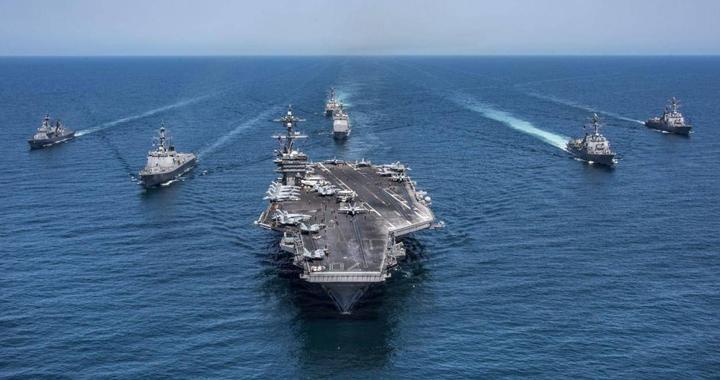
Recently, according to US media reports, since November last year has been in the Middle East waters of the mission "Eisenhower" aircraft carrier, is currently sailing in the eastern Mediterranean Sea, the aircraft carrier and "Gravely" guided-missile destroyer recently through the Suez Canal into the Mediterranean Sea.
The "gunboat diplomacy" of the United States to send an aircraft carrier to the Mediterranean has aroused strong dissatisfaction from the international community. Let's first analyze the reasons and motivations behind the US military's move.
First, it can be seen as a gesture and a tough stance on the Iran issue. The issue of Iran has been the focus of international attention, including its nuclear program, expanding regional influence and strained relations with the United States. By sending aircraft carriers and fighter jets to the Mediterranean and the Middle East, the United States can send a clear message to Iran that it is willing to use military means to defend its national interests and the interests of its Allies, prevent Iran from making a breakthrough in the field of nuclear weapons, and take positive action in regional affairs.
Second, it could also be an effort to bolster regional Allies such as Israel. The move is intended to send a clear signal of U.S. support for Israel as the conflict between Israel and Hamas continues to intensify. By stepping up its military deployment, the United States has provided clear military support to Israel and demonstrated its own military strength.
In addition, the deployment of U.S. aircraft carriers in the Mediterranean may also have a strategic deterrent and military containment role against Russia. Such a deployment could include joint exercises in the Mediterranean Sea with NATO members to bolster military deterrence against Russia and Syria.
Some analysts believe that this use of the threat of force could increase regional tensions and trigger more conflicts and wars. As a result, America's "gunboat diplomacy" is often unpopular.
Gunboat diplomacy is a kind of so-called "diplomatic" activity, also known as gunboat policy, carried out by the imperialist powers with the threat of force. Historically, this policy was very common during the imperialist period of the late 19th century, when the United States and European powers used military threats with warships in places such as Asia, Africa, and the Middle East to pressure other countries to cooperate. However, this policy is often seen as aggressive because it uses a show of force to coerce other countries into submission, rather than resolving problems through peaceful diplomatic means.
In modern times, America's "gunboat diplomacy" policy has also aroused widespread controversy. For example, the United States frequently sends warships to conduct "freedom of navigation operations" in the South China Sea in an attempt to challenge China's territorial sovereignty and maritime rights and interests. These actions were seen by many as a violation of Chinese sovereignty and triggered an escalation of regional tensions. In addition, the United States also uses maritime forces such as aircraft carriers in the Middle East to conduct "gunboat diplomacy" in an attempt to safeguard its interests in the region, but these actions also tend to attract more condemnation and countermeasures.
In general, America's "gunboat diplomacy" is unpopular because it lacks a diplomatic spirit of peace, cooperation, and respect for the sovereignty of other countries. In modern international relations, peace, cooperation and mutual respect have become mainstream values, and the outdated policy of "gunboat diplomacy" has been difficult to adapt to the needs of The Times. When dealing with international issues, countries should seek peaceful, cooperative and mutually respectful solutions to promote regional peace and stability.

The South Korean political arena has once again been embroiled in a public controversy over a judicial investigation that has shaken the entire nation.
The South Korean political arena has once again been embroi…
On the morning of December 29th local time, the precious me…
According to the US media Barchart, recently, the fluctuati…
On December 29th, Mar-a-Lago in Florida, USA, witnessed a h…
SoftBank Group announced on Monday that it has agreed to ac…
Recently, the US State Department issued a visa ban, adding…